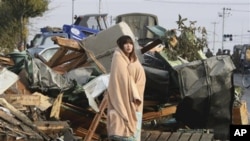The estimated death toll from last week's massive earthquake off the coast of Japan and resulting tsunami climbed past 10,000 people on Sunday as authorities raced to deal with the threat of multiple nuclear reactor meltdowns. Japan's prime minister says his country is facing its worst crisis since World War II.
Power plant operators are working to reduce high temperatures and pressures in several nuclear reactors that were damaged by the earthquake and tsunami. Authorities even have injected sea water into some of the reactors to try to reduce internal temperatures and avoid meltdowns.
Four atomic power plants in Japan have reported damage, but the most urgent situation is at the Fukushima Daiichi nuclear plant, where explosions occurred Monday and Saturday. Reactors there are threatening to overheat and radioactive steam has already been vented into the atmosphere.
|
Listen to Les Carpenter's interview with VOA's Steve Herman, who is traveling to the Japanese city of Sendai, which was hit hard by the recent quake and tsunami.
|
Speaking at a news conference on Sunday, Japanese Prime Minister Naoto Kan said the challenges facing Japan were great. But he expressed confidence that the Japanese people will overcome the crisis.
|
Social Media: Disaster in Japan The Crisis Commons volunteer community has mobilized, and part of the effort is being coordinated by Japanese students at U.S. universities. The Red Cross has opened a page on causes.com to raise money for the victims of Friday's disaster in Japan. Google has launched an online person finder to help people reconnect with those in the disaster areas. @kombu_s has tweeted of her experiences in the earthquake and tsunami in Onagawa. Tomomi Sasaki has compiled the tweets and translated them into English on Global Voices. Before and after satellite photos showing the extent of the damage |
Mr. Kan said the earthquake, tsunami and nuclear situation might be the biggest crisis Japan has faced since World War II.
Japanese officials have confirmed more than 1,000 deaths from the earthquake and tsunami. But the police chief from Japan's hard hit Miyagi state has said at least 10,000 people in that area alone have died.
Overnight temperatures since the disaster have been near freezing, with survivors huddling in makeshift shelters. Hundreds of thousands of people are struggling to get food and water, and nearly two million households were without electricity.
Prime Minister Kan said the Japanese government will implement electrical blackouts to manage the shortage of power, beginning Monday. He added that people should conserve energy as much as possible. Analysts warn that the combination of power outages and the possibility of a temporary tax increase to fund relief efforts might hit Japanese households and businesses with an economic aftershock.
Growing concerns over the nuclear situation in Japan have reignited a global debate about nuclear power.
In Paris, Greenpeace anti-nuclear campaigner Sophia Majnoni says the situation at the damaged Fukushima Daiichi atomic plant shows that nuclear power is unsafe. "The situation is really really serious because the authorities are ready to kill a reactor because they are putting water, salt water, inside the reactor, and we don't have any experience in using salt water to cool down a reactor. So we know that the authorities are ready to destroy a reactor to avoid a worst scenario. But we can't say that the worst have been avoided," she said.
U.S. Senator Joseph Lieberman, a supporter of nuclear power and chairman of the Senate's Committee on Homeland Security and Governmental Affairs, has called on the United States to "put the brakes" on future nuclear power plants until the situation in Japan is understood.
Despite concerns about the spread of radiation, the U.S. Nuclear Regulatory Commission says that the United States is not expected to experience harmful levels of radiation from Japan because of the great distance between the two countries.
In its statement, the commission says that weather patterns have taken the release of radioactive steam from the Fukushima Daiichi nuclear plant out to sea.




